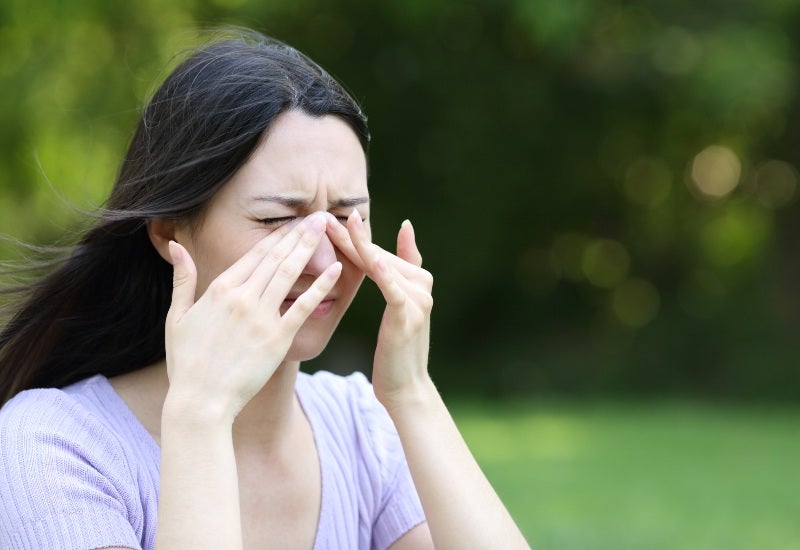Allergic Conditions
Get Support for Your Allergic Conditions in Burbank, CA
Living in sunny Southern California should be a breeze, but for many, allergic conditions can turn each day into a struggle. At SoCal Breathe Free Sinus & Allergy Centers, we know how frustrating allergic conditions can be. That’s why we’re here to help you understand and manage them so you can breathe easy again. With locations in Burbank and San Diego, we specialize in advanced sinus and allergy treatments to help you regain your quality of life.

What Are Allergic Conditions?
Allergies are an exaggerated immune response to substances that are generally not harmful. These allergens can trigger various symptoms depending on the type of allergy. For example, dust allergies can cause sneezing, runny or stuffy nose, and itchy eyes. Food allergies can lead to hives, swelling, and even life-threatening anaphylaxis. Understanding the specific type of allergic condition you suffer from is the first step toward getting allergy treatment. There are several types of allergies that can affect different parts of the body:
- Dust Allergies: Can cause sneezing, runny nose, and itchy eyes.
- Pet Allergies: Often result in similar symptoms to dust allergies but are triggered by pet dander.
- Seasonal Allergies: Caused by pollen and mold, leading to hay fever or allergic rhinitis.
- Food Allergies: Common offenders include peanuts, shellfish, and dairy, which can cause symptoms ranging from digestive issues to anaphylaxis.
- Insect Sting Allergies: Allergic reactions to bee or wasp stings can range from mild swelling to severe anaphylactic reactions.
- Drug Allergies: Reactions to medications like antibiotics or aspirin can cause hives, swelling, or more severe reactions.
- Latex Allergies: Often affecting healthcare workers, latex allergies can cause rashes, itching, and more severe respiratory symptoms.
Skin Allergies & Conditions
Skin is the body’s largest organ and a common site for allergic reactions. Conditions like eczema, allergic contact dermatitis, and hives are frequent culprits. Eczema, often seen in children, is characterized by dry, itchy, and inflamed skin. Allergic contact dermatitis occurs when the skin comes into contact with an allergen like nickel or poison ivy, causing redness and swelling. Hives, or urticaria, manifest as red, itchy, and raised areas on the skin, often triggered by food, medication, or insect bites.
Healthy Tips for Managing Allergies
Here are some easy tips to help you manage your allergic conditions:
- Avoid Triggers: Identify and avoid known allergens. For instance, if you have a dust allergy, keep your home clean and use air purifiers.
- Medication: Antihistamines can help manage symptoms like sneezing and itching. Consult your allergist for a tailored medication plan.
- Immunotherapy: Allergy drops or shots can help desensitize your immune system to specific allergens.
- Healthy Lifestyle: Maintaining a balanced diet, staying hydrated, and getting regular exercise can boost your immune system and help manage symptoms.
- Be Careful with Skin Products: If you have skin allergies, use hypoallergenic skincare products to avoid irritation.
- Watch What You Eat: If you have food allergies, always check food labels and be cautious when eating out to avoid accidental exposure.
These tips can help you keep your allergies in check and make life more comfortable.
When to Get Immediate Medical Attention?
While many allergies can be managed at home, some reactions need immediate medical attention. If you experience symptoms like trouble breathing, swelling in your face or throat, or a fast heartbeat, seek emergency care right away. These could be signs of a serious allergic reaction called anaphylaxis.
How Are Allergies Diagnosed?
Allergy diagnosis typically involves a combination of patient history, physical examination, and diagnostic tests such as skin prick tests or blood tests. These tests help identify specific allergens that trigger your symptoms, allowing for targeted treatment plans. We offer several types of tests to pinpoint your specific allergies:
- Skin Prick Test: This is one of the most common methods. A small amount of potential allergens is applied to your skin, usually on the forearm or back. The skin is then lightly pricked to allow the substance to enter just beneath the surface. If you’re allergic to a substance, you’ll develop a small raised bump, similar to a mosquito bite, at the test site.
- Intradermal Test: If the skin prick test doesn’t provide clear results, an intradermal test may be used. This involves injecting a small amount of allergen just under the skin. It’s often used for testing more specific allergies, like those to insect stings or penicillin.
- Patch Test: This test is typically used for identifying contact allergies, such as reactions to fragrances, metals, or latex. Small patches containing potential allergens are applied to your skin and left in place for about 48 hours. The skin is then examined for any reactions.
- Blood Test (IgE Testing): For patients who can’t undergo skin testing or if skin tests are inconclusive, a blood test may be recommended. This test measures the level of immunoglobulin E (IgE) antibodies in your blood, which are produced by the immune system in response to allergens.
Other Services at SoCal Breathe Free Sinus & Allergy Centers
Beyond allergy treatment, our centers specialize in a variety of services aimed at improving your respiratory health, including:
Ready to Breathe Free?
Don’t let allergic conditions control your life. Visit us at SoCal Breathe Free Sinus & Allergy Centers in Burbank and San Diego. We are committed to helping you breathe freely and enjoy life without the burden of allergy symptoms. Contact us today to schedule a consultation and take the first step toward effective allergy management.
